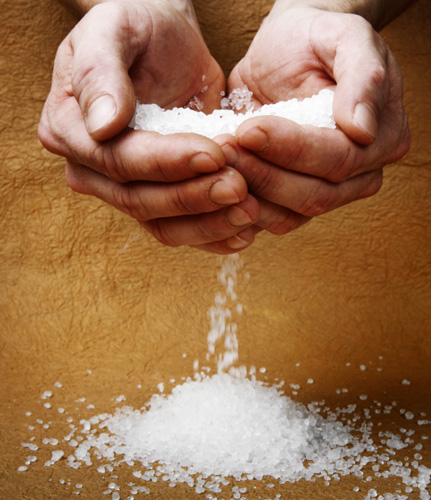I have been privileged to know and to have worked with many fine priests.
One of my favorites is Fr. Jack Gleason, pastor of my home parish, the Church of the Madalene, in Tulsa.
Above all, his pastoral care in times of tragedy and trouble has been all I could ever have hoped for.
He is also that rare priest whose homilies frequently seem to bore right into your soul and speak to to you in that special way. That way which gives you assurance that those words are from God and have particular meaning especially for you.
Fr. Jack’s homily last Sunday was one of those special moments and I wanted to record my thoughts about it while they are still fresh in my mind.
The Gospel reading for the 5th Sunday of Ordinary time (Year A), is from Matthew 5:13-16:
Jesus said to his disciples:
“You are the salt of the earth.
But if salt loses its taste, with what can it be seasoned?
It is no longer good for anything
but to be thrown out and trampled underfoot.
You are the light of the world.
A city set on a mountain cannot be hidden.
Nor do they light a lamp and then put it under a bushel basket;
it is set on a lampstand,
where it gives light to all in the house.
Just so, your light must shine before others,
that they may see your good deeds
and glorify your heavenly Father.”
I’ve heard and read this passage many times, but the way the Fr. Jack expounded on it really resounded in me. I listened to the podcast recording of this homily again and I’m going to paraphrase some of what he said, along with some of my own thoughts.
Christ tells us that we are “the salt of the earth.” But what does that really mean? We know that salt is necessary for life. We also know that salt has no purpose unto itself. It is useful to flavor and preserve other things.
Christ calls us not to be just virtuous, but also to be “salt.” That is, to “raise the level of the flavor in every human activity and therefore to transform it.”
“What is ordinary can be delightful if seasoned with joy,with fidelity, and with our good works.”
If salt loses its taste it becomes insipid (bland, without distinctive, interesting, or stimulating qualities). Apparently, the word “insipid” shares some of the same Greek roots as the word “sophomore,” (sophos wise + mōros foolish), literally meaning a wise fool.
So, to lose taste, to become bland, is to become foolish. A thing is wisest is when it most knows itself. It tastes more like what it is meant to be.
“Wise salt” gives flavor to the world and helps preserve what is good. “Foolish salt” has lost its taste and no longer heightens flavor and no longer preserves anything. It can only be thrown out and trampled under foot.
Since salt is not for itself but gives flavor to other things, it is directed outward. Christians likewise, in order to be “salty” are also called to be directed outward. We are called to do something “out there.” To do something for “them.”
Insipid, bland Christians are foolish Christians who have forgotten who they truly are. They have forgotten their role in society. They have become blended into secular culture and are just as bland as everyone around them.
When we say that someone is “salty,” we usually mean that he uses colorful language. Even if his language is inappropriate, we would agree that he doesn’t blend in, rather he sticks out and is noticed.
We are called not to blend in but to bring life, to bring flavor, zest and joy of what it means to be a Christian into the world. We are called to know who we are and not to forget our identity. If we think like everyone else, act like everyone else, if you can’t tell any difference between us and every other person, what good are we?
When we are what we are meant to be, His salvation will resound throughout the world. As Catholics, we must show the world who we are, what our distinctive flavor is, and not be afraid to show what makes us different.
Just so, your light must shine before others,
that they may see your good deeds
and glorify your heavenly Father.”
We cannot be the salt of the earth if we hide it from others. To be salty is also to be the light set on a lampstand for all to see.
So, this leaves us with a new perspective on the Christian journey. What makes you salty? What is your distinctive flavor that God asks you to bring to the world? What are you doing with it?
Why are you hiding?

I like this very much and will probably listen to the homily later. I’ve been kind of struggling/annoyed with this a little — being a light for someone when I am looking for the lamp myself, ya know? Resonates with me.
We are only able to see at all because light reflects.
That sounds rather profound. I think I’d better reflect on that myself.